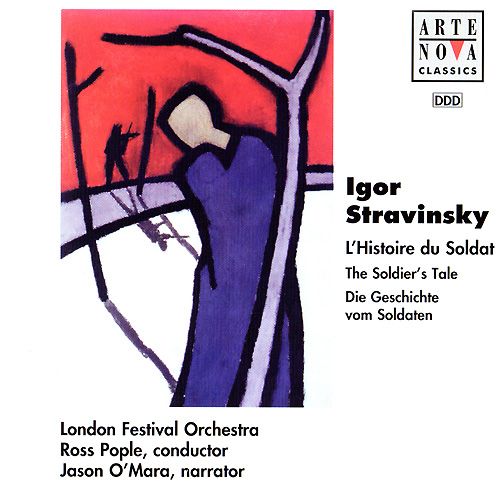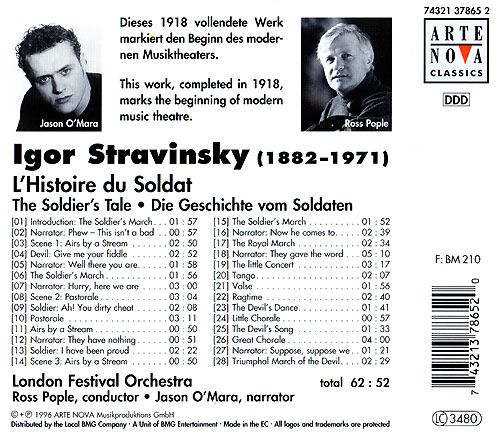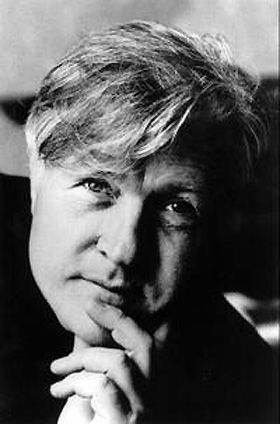wimpel69
11-27-2014, 05:10 PM
EAC-FLAC link below. This is my own rip. Complete artwork,
LOG and CUE files included. Do not share. Buy the original!
Please leave a "Like" or "Thank you" if you enjoyed this!
Prior to embarking on his so-called neo-Classical period in the 1920s, Igor Stravinsky had already
pared down his style considerably from the extravagant ballet scores of the early 1910s to the economy
and restraint that characterizes L'histoire du soldat (The Soldier's Tale). The forced economy of
wartime influenced not only the work's modest resources, but its subject matter. Written in collaboration
with the Swiss author C.F. Ramuz and based on a Russian fable about a fiddle-playing soldier (although
the text is in French), L'histoire was to be narrated, played and danced, but could also be performed
independent of the text as a concert suite. The first performance of L'histoire du soldat took place in
Lausanne Switzerland on September 28, 1918.
Stravinsky and Ramuz based their subject on a collection of Russian tales dealing with the adventures
of a soldier who deserts the army and the devil who eventually possesses his soul. The soldier's desertion
is somewhat glossed over, but the fiddle he carries in his knapsack and which the Devil wins from him,
assumes a symbolic importance that makes the story a kind of miniature version of the Faust legend.
Despite the scenario's Russian basis, Stravinsky made the music as non-Russian as possible by using
North and South American, Spanish, and German material. The score tends to mimic -- and parody --
standard dance styles (ragtime, waltz, and tango) as well as marches and two chorales. The unique
chamber instrumentation emphasizes the high and low registers of each family (violin, double-bass,
clarinet, bassoon, cornet, trombone, and percussion) that leaves room in the middle registers. The
music often abstractly evokes the sound of a New Orleans jazz band, which Stravinsky had recently
become acquainted with through scores imported from America by his colleague Ernest Ansermet.
The score also calls for four dramatis personae: the Soldier and the Devil (both speaking parts),
the Princess (who is silent), and a Reader. Moreover, the Princess and the Devil are required to
dance. The music is organized as a series of brief tableaux with the action presented mainly
through mime and dancing, and continuity supplied by the narrator. The atmosphere of the
entire production suggests a cabaret or an informal street entertainment, and it's portability
has also been referred to as "pocket theater."
Stravinsky's harmonic language is modern, pungent and at times bitonal, yet the weight of
the interest is on the high level of rhythmic complexity and intricacy. From the opening
"Marche du Soldat" to the "Marche Royale," lively, unpredictable rhythms with prickly
irregularities are employed in a firmly tongue-and-cheek manner. Asymmetrical phrases
are juxtaposed against independent accompanimental ostinati, suggesting the uneven tread
of the soldier as he ventures across the countryside.

Music Composed by
Igor Stravinsky
Played by the
London Festival Orchestra
With
Jason O'Mara (narrator)
Conducted by
Ross Pople

"Ross Pople leads the London Festival Orchestra in a complete performance of
L'histoire du soldat, featuring actor Jason O'Mara on all the dramatic parts. The decision
to use a single performer rather than the three specified by the composer changes the
character of the piece, but for a concert performance or recording, it makes good
dramatic sense -- the effect is one of an excellent storyteller recounting a folktale,
and in fact feels less contrived than the use of a narrator and two actors. O'Mara
convincingly uses his voice to delineate the characters and bring them to life,
as any good storyteller must.
O'Mara's performance is so strong, in fact, that the music recedes somewhat from
the foreground to an accompanying role, except for those extended sections in
which the music isn't uninterrupted. This may be due in part to the recording,
which favors the voice. Pople's performance is polished and elegant."
All Music

Download Link - https://mega.co.nz/#!eARlWJDa!W1HAH0lGYIDWax0km6FQq4P6Ewsrp7O57-dgiaCJAjw
Source: Arte Nova CD, 1996 (my rip!)
Format: FLAC(RAR), DDD Stereo, Level: -5
File Size: 211 MB (incl. artwork, booklet, log & cue)
Enjoy! Don't share! Buy the origina! Please leave a "Like" or "Thank you" if you enjoyed this! :)
LOG and CUE files included. Do not share. Buy the original!
Please leave a "Like" or "Thank you" if you enjoyed this!
Prior to embarking on his so-called neo-Classical period in the 1920s, Igor Stravinsky had already
pared down his style considerably from the extravagant ballet scores of the early 1910s to the economy
and restraint that characterizes L'histoire du soldat (The Soldier's Tale). The forced economy of
wartime influenced not only the work's modest resources, but its subject matter. Written in collaboration
with the Swiss author C.F. Ramuz and based on a Russian fable about a fiddle-playing soldier (although
the text is in French), L'histoire was to be narrated, played and danced, but could also be performed
independent of the text as a concert suite. The first performance of L'histoire du soldat took place in
Lausanne Switzerland on September 28, 1918.
Stravinsky and Ramuz based their subject on a collection of Russian tales dealing with the adventures
of a soldier who deserts the army and the devil who eventually possesses his soul. The soldier's desertion
is somewhat glossed over, but the fiddle he carries in his knapsack and which the Devil wins from him,
assumes a symbolic importance that makes the story a kind of miniature version of the Faust legend.
Despite the scenario's Russian basis, Stravinsky made the music as non-Russian as possible by using
North and South American, Spanish, and German material. The score tends to mimic -- and parody --
standard dance styles (ragtime, waltz, and tango) as well as marches and two chorales. The unique
chamber instrumentation emphasizes the high and low registers of each family (violin, double-bass,
clarinet, bassoon, cornet, trombone, and percussion) that leaves room in the middle registers. The
music often abstractly evokes the sound of a New Orleans jazz band, which Stravinsky had recently
become acquainted with through scores imported from America by his colleague Ernest Ansermet.
The score also calls for four dramatis personae: the Soldier and the Devil (both speaking parts),
the Princess (who is silent), and a Reader. Moreover, the Princess and the Devil are required to
dance. The music is organized as a series of brief tableaux with the action presented mainly
through mime and dancing, and continuity supplied by the narrator. The atmosphere of the
entire production suggests a cabaret or an informal street entertainment, and it's portability
has also been referred to as "pocket theater."
Stravinsky's harmonic language is modern, pungent and at times bitonal, yet the weight of
the interest is on the high level of rhythmic complexity and intricacy. From the opening
"Marche du Soldat" to the "Marche Royale," lively, unpredictable rhythms with prickly
irregularities are employed in a firmly tongue-and-cheek manner. Asymmetrical phrases
are juxtaposed against independent accompanimental ostinati, suggesting the uneven tread
of the soldier as he ventures across the countryside.

Music Composed by
Igor Stravinsky
Played by the
London Festival Orchestra
With
Jason O'Mara (narrator)
Conducted by
Ross Pople

"Ross Pople leads the London Festival Orchestra in a complete performance of
L'histoire du soldat, featuring actor Jason O'Mara on all the dramatic parts. The decision
to use a single performer rather than the three specified by the composer changes the
character of the piece, but for a concert performance or recording, it makes good
dramatic sense -- the effect is one of an excellent storyteller recounting a folktale,
and in fact feels less contrived than the use of a narrator and two actors. O'Mara
convincingly uses his voice to delineate the characters and bring them to life,
as any good storyteller must.
O'Mara's performance is so strong, in fact, that the music recedes somewhat from
the foreground to an accompanying role, except for those extended sections in
which the music isn't uninterrupted. This may be due in part to the recording,
which favors the voice. Pople's performance is polished and elegant."
All Music

Download Link - https://mega.co.nz/#!eARlWJDa!W1HAH0lGYIDWax0km6FQq4P6Ewsrp7O57-dgiaCJAjw
Source: Arte Nova CD, 1996 (my rip!)
Format: FLAC(RAR), DDD Stereo, Level: -5
File Size: 211 MB (incl. artwork, booklet, log & cue)
Enjoy! Don't share! Buy the origina! Please leave a "Like" or "Thank you" if you enjoyed this! :)